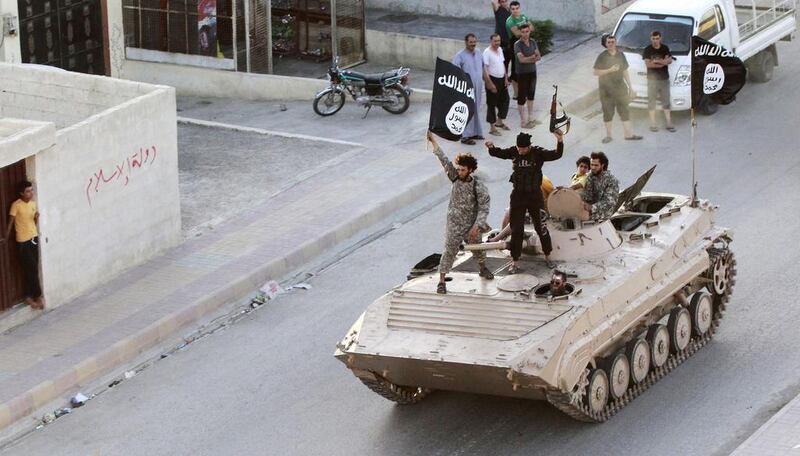ABU DHABI // Grassroots leadership from people who can challenge violent extremism and developing effective programmes against violence are two of the recommendations made in a study by an Abu Dhabi-based think tank.
Experts at Hedayah said the threat posed by terrorist organisations such as ISIL and the potential spread of regional conflicts to the UAE was high.
While battles in cyberspace were fought against radical ideas every day, the frontline could just as easily be in the family living room or on street corners, the study said.
The Hedayah recommendations emerged as the Telecommunications Regulatory Authority (TRA) warned that criminal groups were spreading radical ideologies by using the chat features on some of today’s electronic games to manipulating the emotions of the young and impressionable.
The regulator said that the speed of advances in technology over the past 20 years was unprecedented.
Governments needed to keep pace with such rapid changes as new technology raised questions about the future of social interaction, consumerism and lack of religious learning and understanding.
Sara Zeiger, senior research analyst at Hedayah, which contributed to the Security Jam 2016, Beyond Conventional Security Challenges study, said: “Preventive programmes often work with community leaders, social workers, psychologists, teachers, police, parents and youth leaders – to equip these people with the right motivation, tools and knowledge to intervene if necessary.”
The centre said empowering those best placed to effect change, including religious leaders and family members, was crucial in defending against violence.
Government and civil society needed to challenge the narratives of fanatics with the voices of “credible messengers’ in every community, ones whose voices and views resonated with the target audience,” Ms Zeiger said.
“Religious leaders, for example, may be credible messengers when it comes to ideology, but parents may be better if a main risk has to do with social exclusion or identity.”
Hedayah’s study also assessed whether providing a platform for people to peacefully express challenging ideas could help lessen the appeal of extremism.
It said that there was often too much emphasis on the online element of radicalisation and not enough on offline activities.
“What has been missing so far in many of the prevention programmes is the offline dimension to recruitment,” said Ms Zeiger. “The more successful models for disengagement seem to include some element of face-to-face interaction or mentorship. Very little is being done in terms of non-coercive prevention about the transition between online interactions and offline recruitment.”
Women, especially mothers, should be an integral part of preventive programmes given their unique position within families, the study said.
“But it is important to not assume ‘blanket’ approaches work for every situation – culture, country or context and each locality should work to design policy and programmes that are tailor-made,” said Ms Zeiger.
“There is not a one-size-fits-all solution, but I think there needs to be continued efforts to better coordinate prevention programmes and policies with military and security strategies.”
Experts said the struggle against radicalism was crucial for the UAE.
“It isn’t about principle only, it is about which future we aspire for our young nation,” said Dr Albadr Al Shateri, adjunct professor at the National Defence College. “The UAE and its people see themselves as a progressive nation leading others in development, prosperity and happiness.
“The report has got the basic approach right to combat extremism – one needs to employ all elements of power and a single approach like we’ve seen will not cut it. Any strategy should include a military, economic, information, social, cultural and diplomatic approach.”
Mohammed Al Zarooni, director for the policy and programmes department at the TRA, stressed the importance of warning teenagers and young people that some figures in electronic games were fraudulent.
He called on young people to be aware of negative ideas and opinions and to talk to their elders when they were exposed to such groups and consult authorities.
He said: “The groups that adopt such vicious thinking are trying to recruit young people and adolescents through some electronic games, starting with unusual conversations with them in such a way that it reveals their weaknesses so they can be easily exploited and instructed to commit unlawful acts.”
Mr Al Zarooni advised parents to take control of their children’s’ online habits and suggested computers and gaming equipment be kept in common family rooms in the home. Parents might also regularly check the content and character of the games their children play, assess their online social networking, control passwords and limit the amount of time their children spend at the computer.
Dr Theodore Karasik, senior adviser at Gulf State Analytics, said the study was important in measuring progress on countering violent extremism.
“Unfortunately there is much more work to be done,” he said. “What may work in one jurisdiction may not apply in another. Atmospherics play a central role in determining appropriate action and coordination with local police and intelligence agencies.”
He said the role of families, and especially mothers, was important and necessary.
“This aspect goes to the heart of it in terms of halting radicalisation at home or in cyberspace,” he said. “The UAE plays a significant role in this. This report helps to identify trend lines and ways to address extremist recruitment. Findings are fine but implementing them has been a problem for the community.”
cmalek@thenational.ae






